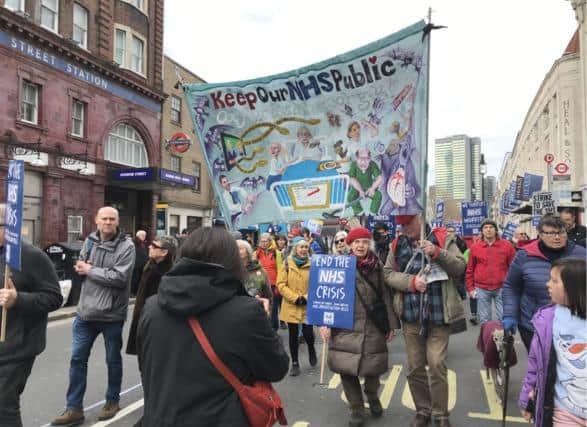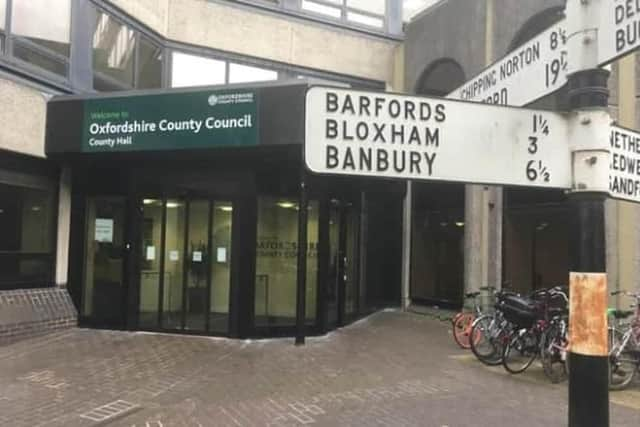Goodbye to the family doctor? - Banbury campaigners support Oxford demo
and live on Freeview channel 276
Keep the Horton General campaigners are backing Keep Our NHS Public Oxfordshire’s (KONPOX) protest outside County Hall on Thursday when members ask councillors not to approve plans to split GPs away from the majority of their patients.
Dr Helen Salisbury, an Oxford GP and GP trainer, said in a seminar last week that while the Government admits to a major shortage of GPs, there are huge restrictions on the number of GP training places.
Advertisement
Hide AdAdvertisement
Hide AdIt is understood the shortfall of GPs is set to increase to around 8,800 GPs by 2030-31, equivalent to one in four posts being vacant. However there were 11,000 applications last year, only a fraction of which received a training place.


Dr Salisbury said the proposed new system would mean those with complex medical histories would be attached to a GP while anyone else would be directed to separate, large ‘hubs’ staffed by nurse practitioners, paramedics and pharmacists – supervised by a single GP.
She said there were many dangers that early indication of serious conditions might be missed, and that insights a GP may have gained into patients and their families may be lost, to the detriment of diagnosis and protection.
Banbury’s campaign group, Keep the Horton General (KTHG), supports Thursday’s protest, which takes place at 9am before the Oxfordshire Joint Health Overview and Scrutiny Committee (HOSC) meeting which will discuss the controversial plans. The groups want councillors to see the dangers of the plan and oppose them.
Advertisement
Hide AdAdvertisement
Hide AdKTHG press officer Charlotte Bird said: “General practice is at the heart of community medicine and anything that splits or destroys that relationship between family doctor, patients and families would be lost and illnesses, social conditions and family situations that need special care may be missed. That would have a huge cost in the future.”


KONPOX spokesman Bill McKeith said: “Unless the public speak out against it, a new model for GP practice is in train for Oxfordshire.
“The proposal is to have ‘Same Day Hubs’ – accessed by 111 or similar for quick consultation but there is no certainty about how that will turn out. Will it be on the phone? With a nurse? In a building miles away from where you live?
"And there would be ‘Integrated Neighbourhood Teams’ for the so-called ‘chronically sick’ – who would get quick access to a GP or even a consultant. But who would decide which patients received this care? It is all very hazy,” he said.
Advertisement
Hide AdAdvertisement
Hide Ad“A long, in-depth study on the family doctor, undertaken by the University of Cambridge over a ten-year period with many thousands of participants, confirmed that seeing a family doctor results in shorter consultations, more accurate and quicker diagnoses and fewer referrals to hospital care.
“The proposed new model takes the patient further away from the family doctor consultation – in fact, in our view, risks the very end of the family doctor patient relationship which is at the heart of the NHS.”
The ‘Primary Care Model’ is being proposed by NHS England to be rolled out by the Integrated Care Board for Buckinghamshire, West Berkshire, and Oxfordshire (BOB ICB).
The local General Practitioner organisation, the Local Medical Committee, and the Oxford Patient Network have come out against the proposal, which is due to be discussed at this Thursday’s Oxon HOSC meeting.
Advertisement
Hide AdAdvertisement
Hide AdKONPOX’s chair Liz Peretz has asked to speak. Those wishing join the protest lobby should gather outside County Hall at 9am with their placards and banners.
The BOB ICB says it aims to improve access to services so patients with non-emergency needs can get same day care, to ensure those with more complex needs get proactive, personalised care from a dedicated team in local communities and to prevent people from becoming unwell and staying healthier for longer.
“In addition, we will need to make better use of digital tools and premises to allow us to work differently. And we need to have measures in place to recruit and retain a skilled workforce,” it says.
Keep Our NHS Public said keeping the current GP service is vitally important.
Advertisement
Hide AdAdvertisement
Hide Ad“Patients rely on a skilled, high quality, reliable, accessible general practice, as this is the main arm of the NHS patients contact. 90 per cent of patient contacts are with primary care,” the national campaign group said.
“A year’s worth of GP care per patient costs less than two trips to A&E, (some estimates are £40 for a GP visit and £250 plus for an outpatient visit), so increasing General Practice’s share of NHS spend - and therefore capacity to prevent, intervene early and treat illness - makes economic sense.
“Primary care is one of the four features highlighted as crucial in top performing health care systems, but the UK comes ninth of eleven high income countries for health care outcomes (Commonwealth Fund).
“Primary care is described by some as at breaking point, as is the rest of the NHS and social care, resulting in higher levels of mortality, illness, pain, and anxiety, with its attendant impact on people’s daily lives, families, and livelihoods.”
Advertisement
Hide AdAdvertisement
Hide AdKONP says: “This crisis was not inevitable, nor the consequence of the pandemic but the result of successive political decisions, a government-made crisis. Other comparably wealthy countries, whatever their model of fundraising, tax and/or social insurance, just spend much more.”
“Patient satisfaction has plummeted as thirteen years of underfunding mean patients face potentially life-threatening waits at each stage, from delays and difficulties contacting GP practices, long waits for an appointment, talking to different clinicians for every contact, who know little about them, repeated telephone triage, frustration with e- consult and Patient Access, long waits for referrals to secondary care for diagnosis and treatment (Healthwatch and others).”